Ökonometrische Methoden für wirtschaftliche Prognosen und Simulationen
Der Forschungsschwerpunkt der Forschungsgruppe liegt in der Entwicklung ökonometrischer Methoden für Kurzfristprognosen (Reduzierte-Form-Modelle), für Regionalisierung und für Langfristprojektionen sowie für strukturelle Prognose- und Simulationsmodelle (DSGE-Modelle). Ferner erstellt sie ökonometrische Hintergrundanalysen für die Prognosetätigkeit der Forschungsgruppe Makroökonomische Analysen und Prognosen. Im Rahmen von Drittmittelprojekten wurden verschiedene makroökonomische Modelle, bspw. für die Volkswagen Financial Services AG oder im Rahmen von GIZ-Projekten für die Wirtschaftsministerien in Kirgistan und Tadschikistan sowie das Institut für makroökonomische Prognosen und Forschung (IFMR) in Usbekistan entwickelt.
IWH-Datenprojekt: IWH Real-time Database
Forschungscluster
Wirtschaftliche Dynamik und StabilitätIhr Kontakt

Mitglied - Abteilung Makroökonomik
PROJEKTE
07.2022 ‐ 12.2026
Evaluierung des InvKG und des Bundesprogrammes STARK
Bundesministerium für Wirtschaft und Klimaschutz (BMWK)
Im Auftrag des Bundesministeriums für Wirtschaft und Klimaschutz evaluieren das IWH und das RWI die Verwendung der rund 40 Milliarden Euro, mit denen der Bund die Kohleausstiegsregionen unterstützt.
10.2019 ‐ 01.2023
An Klimawandel angepasste Wirtschaftsentwicklung
Deutsche Gesellschaft für Internationale Zusammenarbeit (GIZ) GmbH
Der Klimawandel wirkt sich stark auf das Wirtschaftswachstum und die Entwicklung eines Landes aus. Das erhöht den Bedarf an verlässlichen und realisierbaren Ansätzen, mit denen die Auswirkungen von Klimarisiken und potenzielle Anpassungsszenarien bewertet werden können. Die politischen Entscheidungsträger*innen in den Planungs- und Wirtschaftsministerien benötigen fundierte Prognosen, um entsprechende wirtschaftspolitische Instrumente zu konzipieren, zu finanzieren und aktiv gegenzusteuern. In den Pilotländern Kasachstan, Vietnam und Georgien werden Klimarisiken bei der makroökonomischen Modellierung berücksichtigt. Die Ergebnisse werden so in den Politikprozess integriert, dass angepasste Wirtschaftsplanungen entstehen können. Das IWH-Team ist verantwortlich für die makroökonomische Modellierung in Vietnam.
05.2020 ‐ 09.2023
ENTRANCES: Energy Transitions from Coal and Carbon: Effects on Societies
Europäische Kommission
Ziel von ENTRANCES ist es, die Folgen des Kohleausstiegs in Europa zu untersuchen. Wie verändert der Kohleausstieg die Gesellschaft – und wie kann Politik darauf reagieren?
This project has received funding from the European Union’s Horizon 2020 research and innovation programme under grant agreement No 883947.
01.2018 ‐ 12.2023
EuropeAid (EU-Rahmenvertrag)
Europäische Kommission
07.2016 ‐ 12.2018
Klimaschutz und Kohleausstieg: Politische Strategien und Maßnahmen bis 2030 und darüber hinaus
Umweltbundesamt (UBA)
01.2017 ‐ 12.2017
Unterstützung einer nachhaltigen Wirtschaftsentwicklung in ausgewählten Regionen Usbekistans
Deutsche Gesellschaft für Internationale Zusammenarbeit (GIZ) GmbH
01.2017 ‐ 12.2017
Short-term Macroeconomic Forecasting Model in Ministry of Economic Development and Trade of Ukraine
Deutsche Gesellschaft für Internationale Zusammenarbeit (GIZ) GmbH
01.2016 ‐ 12.2017
Entwicklung eines analytischen Tools basierend auf einer Input-Output-Tabelle
Deutsche Gesellschaft für Internationale Zusammenarbeit (GIZ) GmbH
Das Ziel des Projektes war die Entwicklung eines Exceltools zur Wirkungsanalyse von Politikmaßnahmen in Tadschikistan basierend auf dem statischen Input-Output-Ansatz.
11.2015 ‐ 12.2016
Beschäftigung und Entwicklung in der Republik Usbekistan
Deutsche Gesellschaft für Internationale Zusammenarbeit (GIZ) GmbH
Förderung einer nachhaltigen wirtschaftlichen Entwicklung in ausgewählten Regionen Usbekistans
05.2016 ‐ 05.2016
Rahmenbedingungen und Finanzierungsmöglichkeiten für die Entwicklung des Privatsektors in Tadschikistan
Deutsche Gesellschaft für Internationale Zusammenarbeit (GIZ) GmbH
02.2016 ‐ 04.2016
Makroökonomische Reformen und umwelt- und sozialverträgliches Wachstum in Vietnam
Deutsche Gesellschaft für Internationale Zusammenarbeit (GIZ) GmbH
Referierte Publikationen
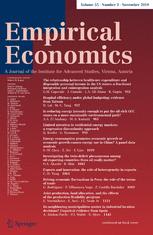
Bottom-up or Direct? Forecasting German GDP in a Data-rich Environment
in: Empirical Economics, Nr. 2, 2018
Abstract
In this paper, we investigate whether there are benefits in disaggregating GDP into its components when nowcasting GDP. To answer this question, we conduct a realistic out-of-sample experiment that deals with the most prominent problems in short-term forecasting: mixed frequencies, ragged-edge data, asynchronous data releases and a large set of potential information. We compare a direct leading indicator-based GDP forecast with two bottom-up procedures—that is, forecasting GDP components from the production side or from the demand side. Generally, we find that the direct forecast performs relatively well. Among the disaggregated procedures, the production side seems to be better suited than the demand side to form a disaggregated GDP nowcast.
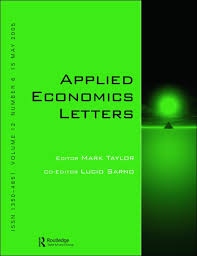
The European Refugee Crisis and the Natural Rate of Output
in: Applied Economics Letters, Nr. 16, 2017
Abstract
The European Commission follows a harmonized approach for calculating structural (potential) output for EU member states that takes into account labour as an important ingredient. This article shows how the recent huge migrants’ inflow to Europe affects trend output. Due to the fact that the immigrants immediately increase the working population but effectively do not enter the labour market, we illustrate that the potential output is potentially upward biased without any corrections. Taking Germany as an example, we find that the average medium-term potential growth rate is lower if the migration flow is modelled adequately compared to results based on the unadjusted European Commission procedure.

Impulse Response Analysis in a Misspecified DSGE Model: A Comparison of Full and Limited Information Techniques
in: Applied Economics Letters, Nr. 3, 2016
Abstract
In this article, we examine the effect of estimation biases – introduced by model misspecification – on the impulse responses analysis for dynamic stochastic general equilibrium (DSGE) models. Thereby, we use full and limited information estimators to estimate a misspecified DSGE model and calculate impulse response functions (IRFs) based on the estimated structural parameters. It turns out that IRFs based on full information techniques can be unreliable under misspecification.
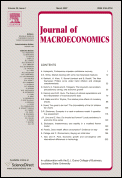
Effects of Incorrect Specification on the Finite Sample Properties of Full and Limited Information Estimators in DSGE Models
in: Journal of Macroeconomics, June 2016
Abstract
In this paper we analyze the small sample properties of full information and limited information estimators in a potentially misspecified DSGE model. Therefore, we conduct a simulation study based on a standard New Keynesian model including price and wage rigidities. We then study the effects of omitted variable problems on the structural parameter estimates of the model. We find that FIML performs superior when the model is correctly specified. In cases where some of the model characteristics are omitted, the performance of FIML is highly unreliable, whereas GMM estimates remain approximately unbiased and significance tests are mostly reliable.
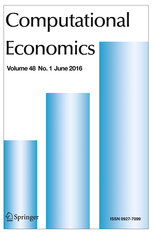
Testing for Structural Breaks at Unknown Time: A Steeplechase
in: Computational Economics, Nr. 1, 2013
Abstract
This paper analyzes the role of common data problems when identifying structural breaks in small samples. Most notably, we survey small sample properties of the most commonly applied endogenous break tests developed by Brown et al. (J R Stat Soc B 37:149–163, 1975) and Zeileis (Stat Pap 45(1):123–131, 2004), Nyblom (J Am Stat Assoc 84(405):223–230, 1989) and Hansen (J Policy Model 14(4):517–533, 1992), and Andrews et al. (J Econ 70(1):9–38, 1996). Power and size properties are derived using Monte Carlo simulations. We find that the Nyblom test is on par with the commonly used F type tests in a small sample in terms of power. While the Nyblom test’s power decreases if the structural break occurs close to the margin of the sample, it proves far more robust to nonnormal distributions of the error term that are found to matter strongly in small samples although being irrelevant asymptotically for all tests that are analyzed in this paper.
Arbeitspapiere
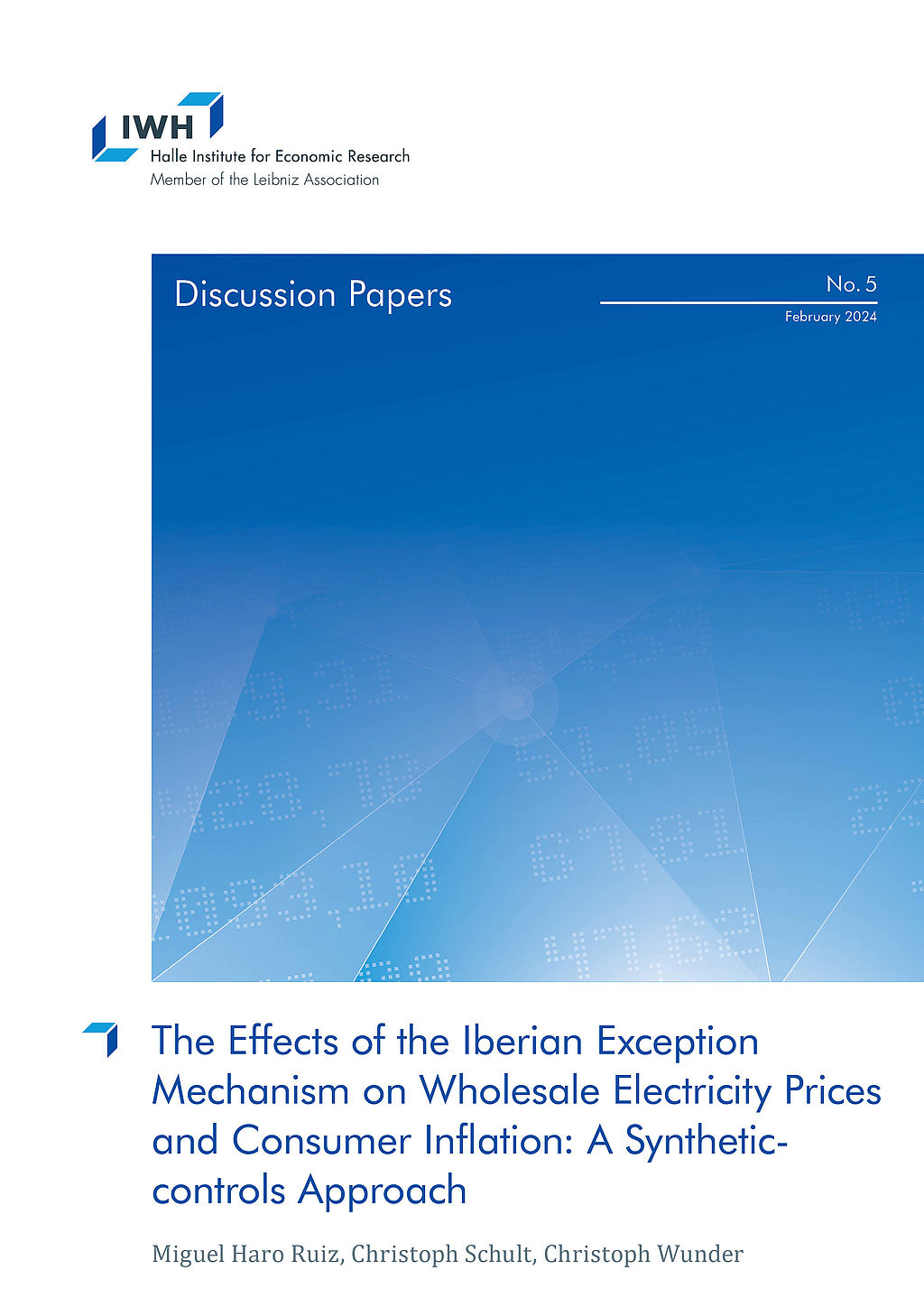
The Effects of the Iberian Exception Mechanism on Wholesale Electricity Prices and Consumer Inflation: A Synthetic-controls Approach
in: IWH Discussion Papers, Nr. 5, 2024
Abstract
This study employs synthetic control methods to estimate the effect of the Iberian exception mechanism on wholesale electricity prices and consumer inflation, for both Spain and Portugal. We find that the intervention led to an average reduction of approximately 40% in the spot price of electricity between July 2022 and June 2023 in both Spain and Portugal. Regarding overall inflation, we observe notable differences between the two countries. In Spain, the intervention has an immediate effect, and results in an average decrease of 3.5 percentage points over the twelve months under consideration. In Portugal, however, the impact is small and generally close to zero. Different electricity market structures in each country are a plausible explanation.
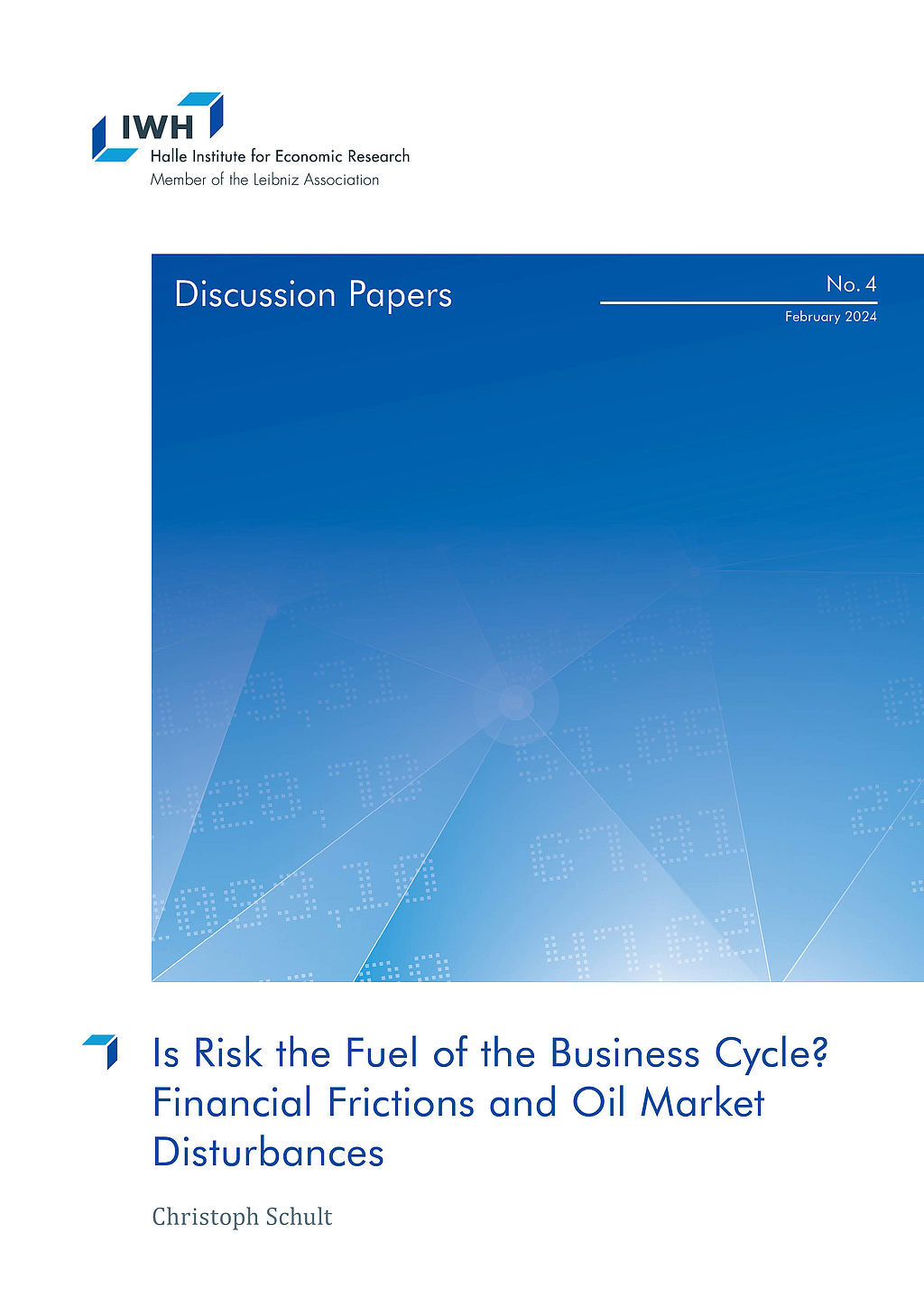
Is Risk the Fuel of the Business Cycle? Financial Frictions and Oil Market Disturbances
in: IWH Discussion Papers, Nr. 4, 2024
Abstract
I estimate a dynamic stochastic general equilibrium (DSGE) model for the United States that incorporates oil market shocks and risk shocks working through credit market frictions. The findings of this analysis indicate that risk shocks play a crucial role during the Great Recession and the Dot-Com bubble but not during other economic downturns. Credit market frictions do not amplify persistent oil market shocks. This result holds as long as entry and exit rates of entrepreneurs are independent of the business cycle.
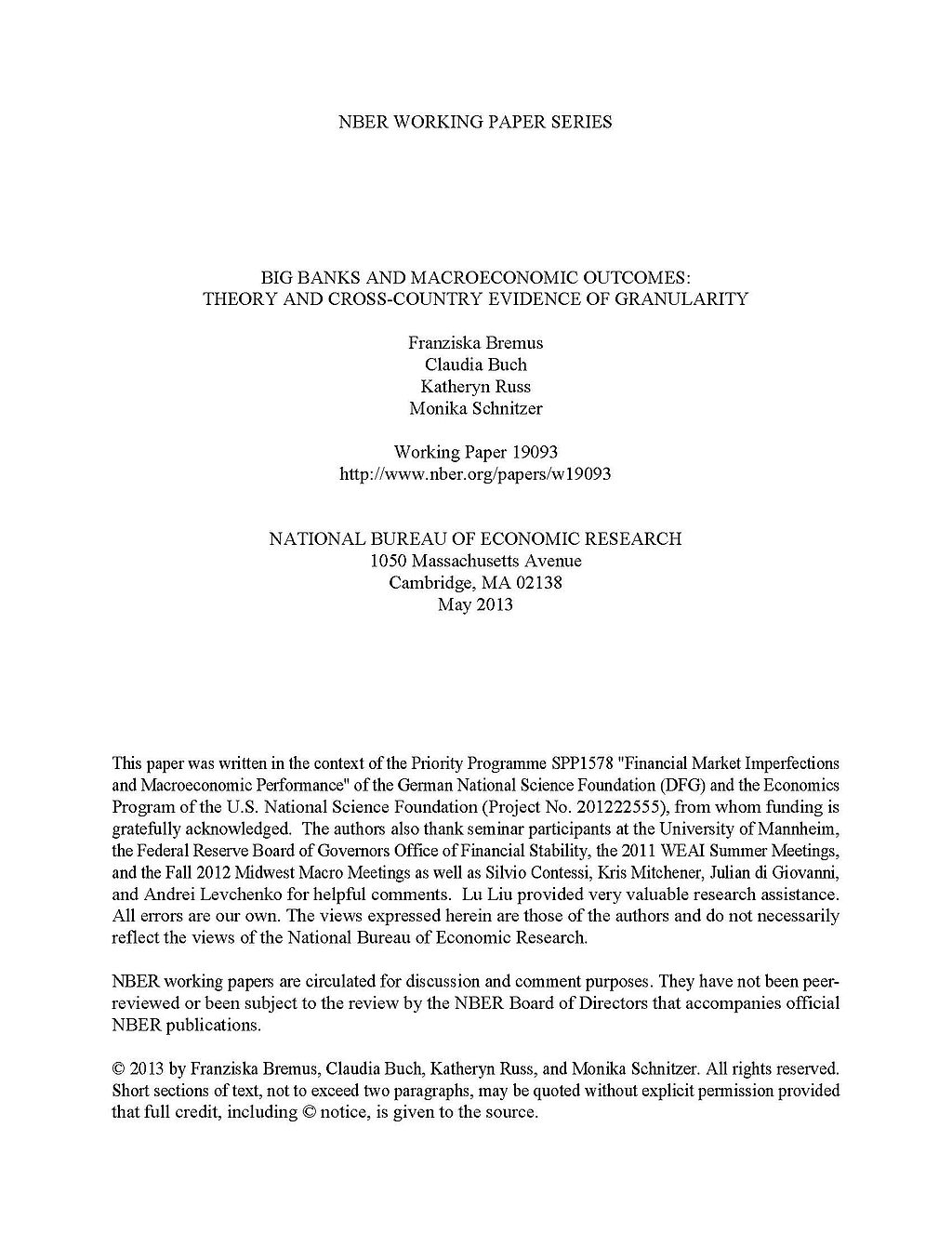
Expectations, Infections, and Economic Activity
in: NBER Working Paper, Nr. 27988, April 2022
Abstract
The Covid epidemic had a large impact on economic activity. In contrast, the dramatic decline in mortality from infectious diseases over the past 120 years had a small economic impact. We argue that people's response to successive Covid waves helps reconcile these two findings. Our analysis uses a unique administrative data set with anonymized monthly expenditures at the individual level that covers the first three Covid waves. Consumer expenditures fell by about the same amount in the first and third waves, even though the risk of getting infected was larger in the third wave. We find that people had pessimistic prior beliefs about the case-fatality rates that converged over time to the true case-fatality rates. Using a model where Covid is endemic, we show that the impact of Covid is small when people know the true case-fatality rate but large when people have empirically-plausible pessimistic prior beliefs about the case-fatality rate. These results reconcile the large economic impact of Covid with the small effect of the secular decline in mortality from infectious diseases estimated in the literature.
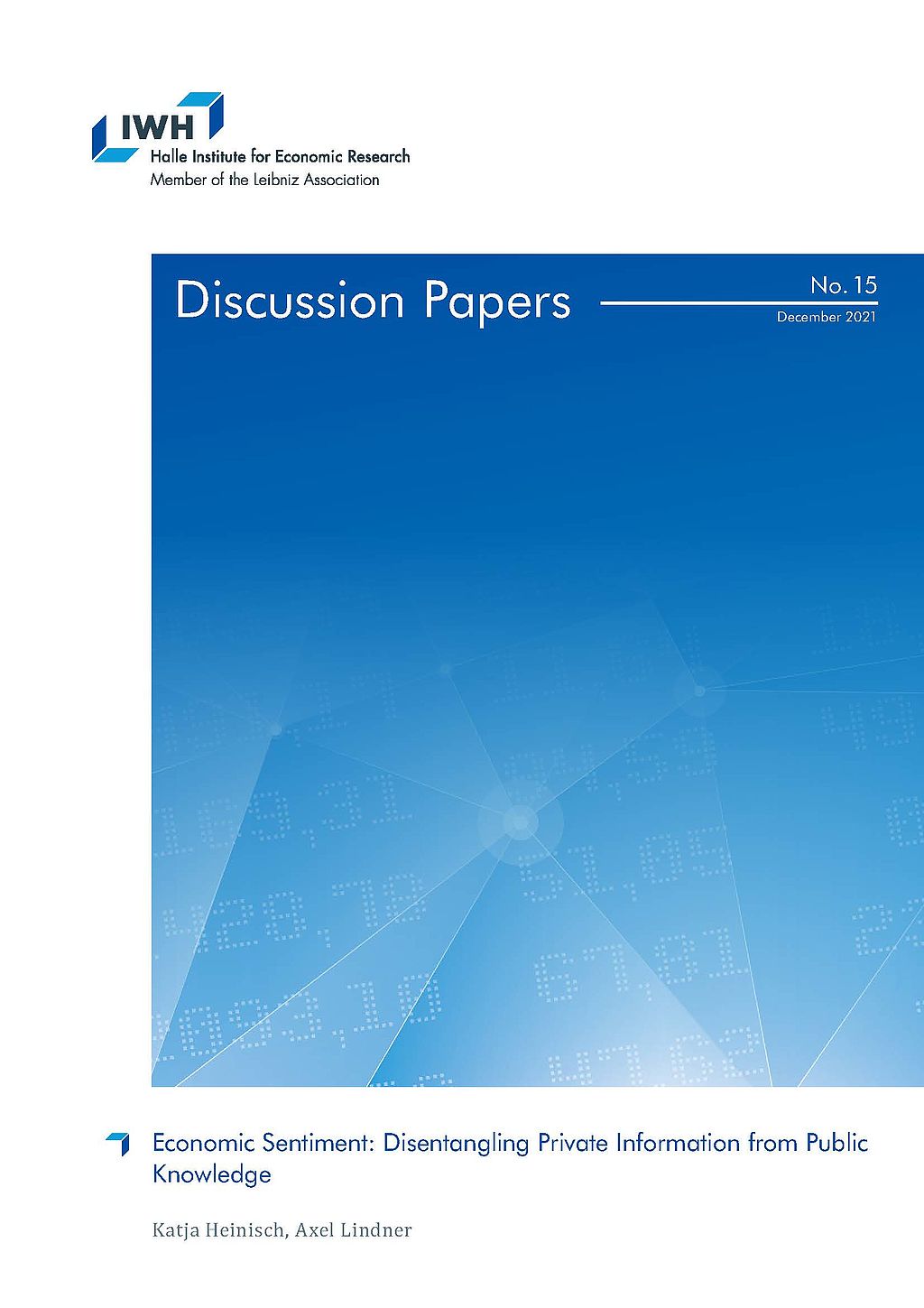
Economic Sentiment: Disentangling Private Information from Public Knowledge
in: IWH Discussion Papers, Nr. 15, 2021
Abstract
This paper addresses a general problem with the use of surveys as source of information about the state of an economy: Answers to surveys are highly dependent on information that is publicly available, while only additional information that is not already publicly known has the potential to improve a professional forecast. We propose a simple procedure to disentangle the private information of agents from knowledge that is already publicly known for surveys that ask for general as well as for private prospects. Our results reveal the potential of our proposed technique for the usage of European Commissions‘ consumer surveys for economic forecasting for Germany.
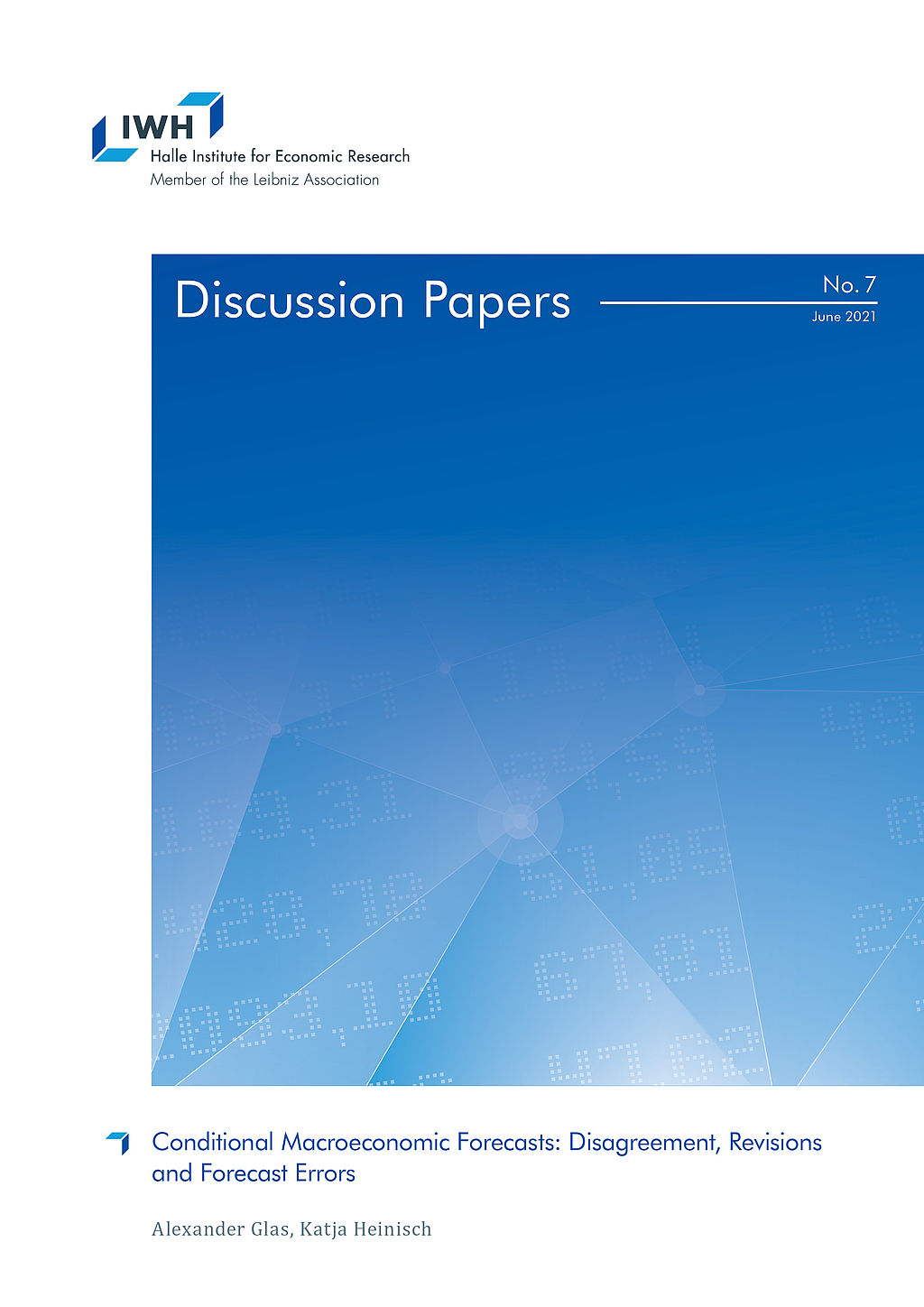
Conditional Macroeconomic Forecasts: Disagreement, Revisions and Forecast Errors
in: IWH Discussion Papers, Nr. 7, 2021
Abstract
Using data from the European Central Bank‘s Survey of Professional Forecasters, we analyse the role of ex-ante conditioning variables for macroeconomic forecasts. In particular, we test to which extent the heterogeneity, updating and ex-post performance of predictions for inflation, real GDP growth and the unemployment rate are related to assumptions about future oil prices, exchange rates, interest rates and wage growth. Our findings indicate that inflation forecasts are closely associated with oil price expectations, whereas expected interest rates are used primarily to predict output growth and unemployment. Expectations about exchange rates and wage growth also matter for macroeconomic forecasts, albeit less so than oil prices and interest rates. We show that survey participants can considerably improve forecast accuracy for macroeconomic outcomes by reducing prediction errors for external conditions. Our results contribute to a better understanding of the expectation formation process of experts.

















